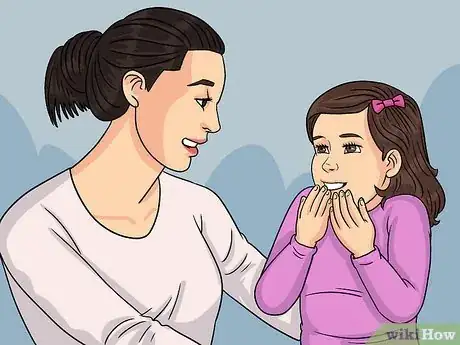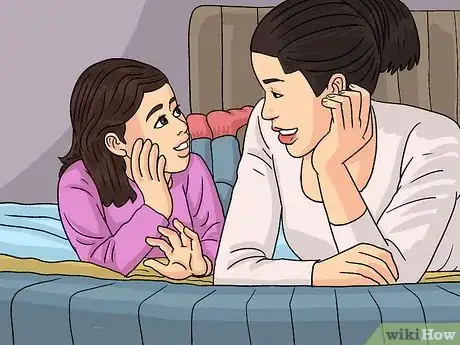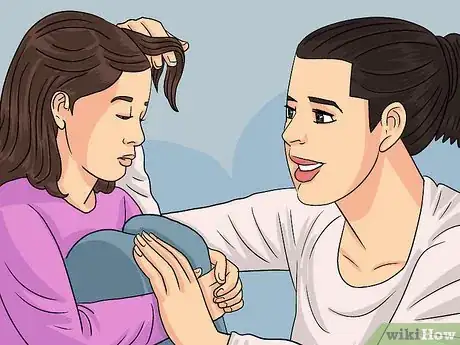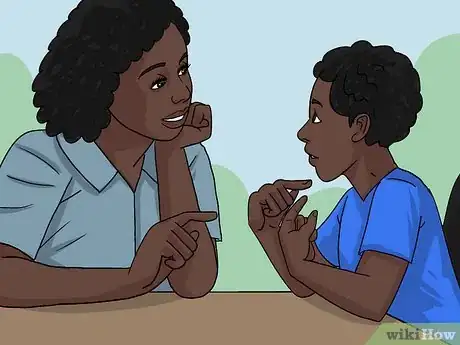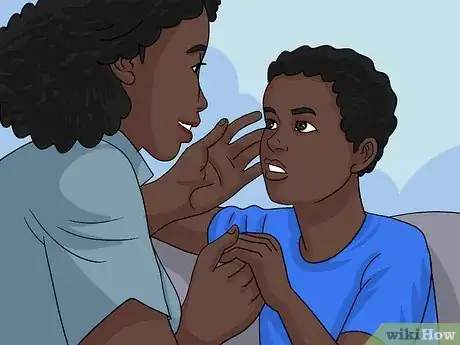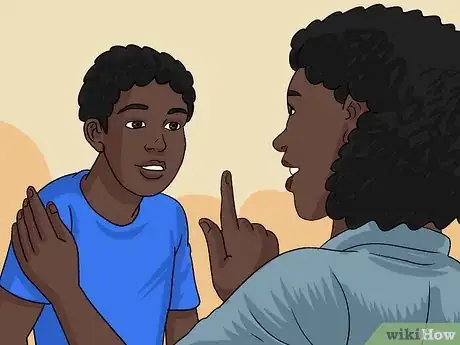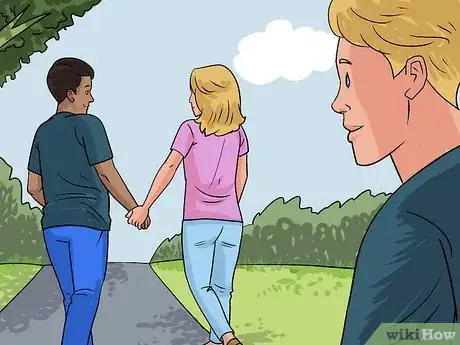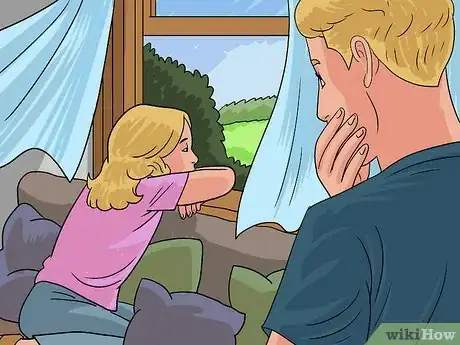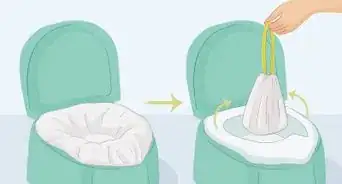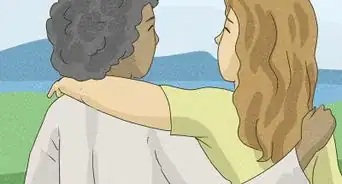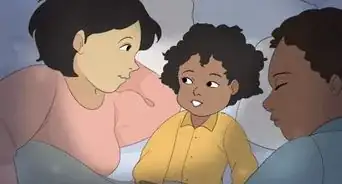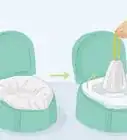X
This article was co-authored by Paul Chernyak, LPC. Paul Chernyak is a Licensed Professional Counselor in Chicago. He graduated from the American School of Professional Psychology in 2011.
This article has been viewed 35,215 times.
A first crush can be an exciting time for a child, but it’s totally understandable if you’re a little freaked out. You may wonder how you should handle their feelings, what advice you should give them, or how to explain how relationships work. That’s where we come in! In this article we’ll walk you through everything you can do to help your child process this experience in the most productive and healthy way possible. We’ll also walk you through what you can do to stay calm and collected.
Steps
Method 1
Method 1 of 3:
Talking About Feelings
-
1Find out if they have a crush. Children as young as elementary school age, and sometimes even preschoolers may decide they have a crush. Often, though, when children have their first crush, parents are the last to know. While some kids may share this exciting new with you first, more often they have already told their friends, siblings, and even their teacher by the time you find out. With a little investigating you can find out about their crush so that you can discuss it with them.[1]
- For instance, you might notice that your child is spending more time focused on their appearance than they usually are.
- Or, for example, you might notice that they get the giggles when you mention a specific classmate or a friend.
- You can always ask your child, “Is there anyone that you might be interested in as more than a friend?”
-
2Discuss romantic versus friendly feelings. When kids are forming friendships, they sometimes declare that they have a crush on someone without really understanding what romantic feelings are or what having a crush means. This can often happen in friends of another gender, where children confuse liking someone as a friend with having a crush. Take some time to talk with your child about exactly what type of feelings they have for their crush. This may help them distinguish between liking someone as a platonic friend and having a crush.
- For example, you might explain that when you have a crush on someone, you often want to spend more time around them. You might say, “When you have crush feelings, that person makes you feel happy just by being around.”
- Be sure to normalize your child's feelings to keep them from getting embarrassed around their crush. Let them know that having a crush is totally normal and healthy.
- If you are unsure how to approach this subject with your child, look online for age-appropriate video resources. These can sometimes be more comprehensive and more relatable.
Advertisement -
3Talk about handling rejection. One of the difficult parts about having a crush, especially your first crush, is if the person doesn’t feel the same. When you talk to your child about their crush, take some time to find out how their crush feels about them. Discuss some of the ways to handle it appropriately if your child’s feelings aren’t reciprocated.[2]
- For instance, you could say something like, “Have you told your crush how you feel? Do you plan on telling them?”
- Or, you might explain, for example, “Sometimes you can have feelings about someone, but they don’t feel the same about you. It doesn’t mean there’s anything wrong with you. It just means the other person has different feelings, and that’s okay.”
Advertisement
Method 2
Method 2 of 3:
Discussing Appropriate Interactions
-
1Talk about telling their crush how they feel. Although your child may have their first crush, and while they might have told all of their friends about it, they may be unsure exactly how to tell their crush how they feel. You can help them by letting them know it's okay if they don’t want to tell their crush. You can also help by giving them a few suggestions for how to talk to their crush.
- You might tell your kindergartener with a crush on their older sibling’s friend, “It’s okay for you to have a crush on Sam and keep it a secret. Sometimes that’s how crushes are.”
- Or, you might say, “When you tell your crush you like them, remember that you’re being brave by telling them.”
-
2Discuss what’s okay for relationships at their age. Because this is a first crush, your child might not know exactly what to expect or do. Take the time to think about what types of interactions and relationships you’re okay with you child having. Then talk with your child about what crushes and relationships should look like for someone their age.[3]
- You might start by explaining that their feelings are normal. You could say something like, “It’s okay for you to have these feelings and to want to be around your crush.”
- You might also say, “At your age, I’m okay with you sitting next to your crush, holding their hand, and talking on the phone.”
-
3Set boundaries. Although developing a crush is a normal occurrence for children, there should be guidelines and limits set on appropriate interactions between kids. Explain to your child what types of displays of affection are only for older kids, as well as what kinds are only okay for adults.[4]
- For instance, you could explain to your preschooler, “It's okay for you to hold hands and sit by each other, but you aren’t allowed to kiss.”
- Or, with a preteen, you might say, “You aren’t old enough yet to cuddle or kiss.”
Advertisement
Method 3
Method 3 of 3:
Coping with Your Own Concerns
-
1Accept your child’s feelings. One of the hardest parts of handling your child’s first crush, is accepting that your little one is growing up. Instead of resisting this natural part of your child’s development, accept that it’s happening and support your child through the process.
- Talk to other parents about how they handled their child’s first crush in order to get ideas for how to cope with your child’s feelings.
- Avoid telling your child that their feelings aren’t real or appropriate because you aren’t ready for them to have a crush.
-
2Give your child appropriate space. You may want to talk about your child’s crush every opportunity you have or supply them with tips on handling the crush. But you and your child will handle the crush better if you step back a bit and let your child experience their crush.[5]
- Ask about their crush every now and then, but avoid interrogating them about it on a regular basis. They may get embarrassed, or even annoyed, and resist sharing anything with you.
- Let them experience the course of the crush on their own. Although you may want to, you can’t control how they feel or how anyone else feels about them. Let them experience their crush without too much input so that it seems like a normal part of life rather than a big deal.
-
3Trust your instincts. While childhood crushes are a normal, and even frequent occurrence, you should also trust your gut and judgment if you feel something isn’t right about the situation. If you have any concerns about the nature or result of your child’s crush, you should strongly consider finding out more about the situation.
- For instance, if you think your preteen’s crush on the neighbor is making them do things that break your rules, you should trust your instincts and address the situation.
Advertisement
References
- ↑ http://www.parents.com/kids/development/friends/how-to-handle-your-childs-first-crush/
- ↑ http://www.todaysparent.com/kids/school-age/how-to-handle-your-childs-first-crush/
- ↑ https://www.familyeducation.com/fun/teen-love/coping-kids-first-crushes
- ↑ http://www.healthguidance.org/entry/16092/1/Tips-to-Handle-Your-Childs-First-Crush.html
- ↑ http://www.healthguidance.org/entry/16092/1/Tips-to-Handle-Your-Childs-First-Crush.html
About This Article
Advertisement
